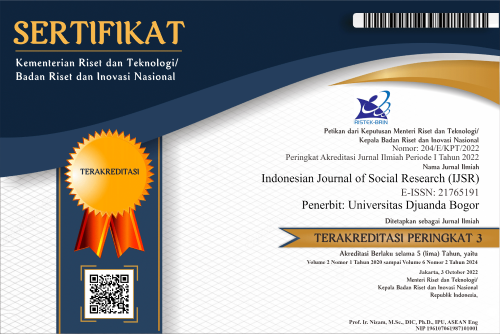The Social and Cultural Values Transmission of An Oral Tradition
Abstract
The purpose of this research is to explore the oral traditions that exist in the Becirongengor village as well as the social and cultural values contained in these oral traditions so that these values can provide learning for the local community. Starting from the problem that the oral tradition that develops in society is starting to lose its existence. Currently the role of oral tradition has begun to be replaced by the existence of social media that has mushroomed in the community. The question is how the oral tradition is able to provide social and cultural values among the community, especially the Becirongengor Village community. The qualitative descriptive method is the chosen research method. The results found that there are still oral traditions that develop in the community, namely (1) the history of Beciro and Ngengor; (2) Haul Mbah Janten and Mbah Surogati; (3) the Kleman Tradition; (4) Paseban Karang Jiwo; (5) MBET traditions; and (6) Slametan. The social and cultural values implicit in the oral tradition are the values of mutual cooperation, andap ashor, tepo seliro, aji mareng sesepuh, friendship, tolerance, religious, and historical values. Of course, oral tradition also provides benefits in social science and cultural education among people, who have experienced the process of transmitting social values that function for entertainment, reminiscing about the past (meaning to history studying), solidarity and togetherness, religious or religious functions, social control, and education.
References
Amir, A. (2013). Sastra Lisan Indonesia. Yogyakarta: Penerbit Andi.
Barr, R., Barth, J. L., & Shermis, S. S. (2003). Hakekat Studi Sosial: The Nature of Social Studies. Terjemahan Buchari Alma dan M. Harlasgunawan Ap. Bandung: Alfabeta.
Endraswara, S. (2013). Folklor Nusantara. Yogyakarta: Ombak.
Endraswara, S. (2013). Teori Kritik Sastra: Prinsip, Falsafah, dan Penerapan. Yogyakarta: Center for Academic Publishing Services (CAPS).
La Sudu. (2012). Tradisi Lisan Kabhanti Gambusu pada Masyarakat Muna di Sulawesi Tenggara. Tidak Dipublikasikan. Tesis. Depok: Program Magister Ilmu Susastra Peminatan Budaya Pertunjukan Fakultas Ilmu Pengetahuan Budaya Universitas Indonesia.
Nottingham, E. K. (1994). Agama dan Masyarakat Penganut Sosiologi Agama. Jakarta: PT Raja Grafindo Persada.
Sibarani, R. (2012). Kearifan Lokal: Hakikat, Peran dan Metode Tradisi Lisan. Jakarta: Asosiasi Tradisi Lisan.
Supriatin, Y. M. (2012). Tradisi Lisan dan Identitas Bangsa: Studi Kasus Kampung Adat Sinarresmi, Sukabumi. SASTRA, KULTUR, DAN SUBKULTUR, 107. (Diakses tanggal 17 Januari 2020 pukul 13.51 WIB.)
Utomo, C. B., & Kurniawan, G. F. (2017). Bilamana tradisi lisan menjadi media pendidikan ilmu sosial di masyarakat Gunungpati. Harmony, 2(2), 169-184. (Diakses pada tanggal 21 Februari 2020)
Yanzi, H. (2017). Penguatan Tradisi Lisan Sebagai Upaya Eksistensi Nilai-Nilai Multikutur. Repository LPPM Unila. (Online) http://repository.lppm.unila. ac.id/6637/1/Tradisi%20Lisan.pdf (Diakses pata tanggal 21 Februari 2020.
Copyright (c) 2020 Indonesian Journal of Social Research (IJSR)

This work is licensed under a Creative Commons Attribution-ShareAlike 4.0 International License.
The Authors submitting a manuscript do so on the understanding that if accepted for publication, copyright publishing of the article shall be assigned/transferred to Indonesian Journal of Social Research (IJSR) Universitas Djuanda as Publisher of the journal. Upon acceptance of an article, authors will be asked to complete a 'Copyright Transfer Agreement'. An e-mail will be sent to the corresponding author confirming receipt of the manuscript together with a 'Copyright Transfer Agreement' form by online version of this agreement.
Indonesian Journal of Social Research (IJSR) Universitas Djuanda, the Editors and the Editorial Board make every effort to ensure that no wrong or misleading data, opinions or statements be published in the journal. In any way, the contents of the articles and advertisements published in the Indonesian Journal of Social Research (IJSR) Universitas Djuanda are sole and exclusive responsibility of their respective authors and advertisers.
Remember, even though we ask for a transfer of copyright, our journal authors retain (or are granted back) significant scholarly rights as mention before.
The Copyright Transfer Agreement (CTA) Form can be downloaded here: Copyright Transfer Agreement-IJSR 2020
The copyright form should be signed electronically and send to the Editorial Office e-mail below:
Dr. Rasmitadila, M.Pd (Editor-in-Chief)
Universitas Djuanda
Jl. Tol Jagorawi No.1, Ciawi, Kec. Ciawi, Bogor, Jawa Barat 16720
Website: http://journal.unida.ac.id/index.php/IJSR/index
Email: ijsr@unida.ac.id





4.png)



